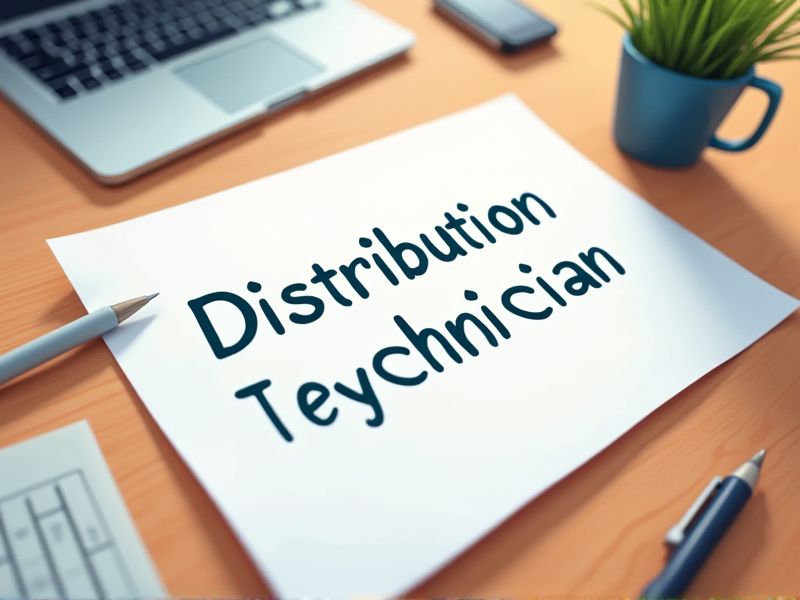
A Distribution System Technician is tasked with maintaining and operating systems critical for water and energy delivery, ensuring smooth and safe distribution. Certifications equip technicians with specialized knowledge and skills needed to handle complex equipment and adhere to safety protocols. Proper certification minimizes operational risks and improves service reliability, which is vital in preventing potential system failures. Key certifications are essential for any aspiring Distribution System Technician.
OSHA 10 Safety Certification
The OSHA 10 Safety Certification is essential for Distribution System Technicians because it equips them with the necessary knowledge to identify potential hazards and reduce workplace accidents. Enhanced safety skills result in fewer injuries, positively impacting work continuity and productivity. Regulatory bodies often require this certification, as it aligns with compliance standards for occupational safety. Certified technicians foster a safety-conscious environment, contributing to a culture of caution and prevention within their teams.
Electrician Journeyman License
Having an Electrician Journeyman License ensures a Distribution System Technician has verified skills and knowledge in electrical systems, essential for maintaining safety and efficiency. This license acts as a validation of experience, reducing the risk of electrical mishaps. Employers often require this credential as part of standard compliance and quality assurance measures. It also provides career advancement opportunities, as licensed technicians are often preferred for more complex projects.
NFPA 70E Electrical Safety Certification
NFPA 70E Electrical Safety Certification is needed for Distribution System Technicians to ensure they are knowledgeable about standards to minimize electrical hazards. Without this certification, technicians may lack awareness of critical safety protocols, increasing the risk of serious accidents. Knowledge from NFPA 70E enables technicians to implement best practices for electrical maintenance and operations. This certification also builds confidence in their ability to identify and mitigate potential risks effectively.
NERC CIP Certification
NERC CIP Certification ensures Distribution System Technicians understand and comply with regulations aimed at safeguarding critical infrastructure, thereby reducing risks of cyber threats. Without this certification, a technician may inadvertently neglect crucial security protocols, potentially leading to significant disruptions in power distribution. The certification also helps standardize skills and knowledge across the industry, promoting consistent application of security measures. Compliance with NERC CIP standards is often a regulatory requirement, ensuring that technicians are legally equipped to handle sensitive infrastructure.
SCADA Systems Training Certification
SCADA systems training certification enhances a distribution system technician's ability to effectively monitor and control complex power networks. As utilities increasingly automate operations, a technician equipped with SCADA knowledge can optimize energy distribution, reducing downtime and improving service reliability. Regulatory requirements often mandate that technicians maintain up-to-date technical skills, and SCADA certification fulfills this need by validating proficiency. Companies investing in trained SCADA-certified technicians generally experience fewer operational inefficiencies and minimized risk of system failure.
Arc Flash Safety Training Certification
Distribution system technicians work in environments with high voltage levels, making arc flash safety training certification crucial to prevent life-threatening injuries. The certification provides technicians with the knowledge to recognize and mitigate the risks associated with electrical arcs. Proper training ensures compliance with safety regulations, reducing potential legal liabilities for the employer. Certified technicians are equipped to implement best practices, enhancing workplace safety and operational efficiency.
Confined Space Entry Certification
Confined Space Entry Certification is essential for Distribution System Technicians because they often encounter work environments that are enclosed or partially enclosed, which can have hazardous atmospheric conditions. This certification ensures that technicians have the knowledge and skills to recognize potential hazards such as toxic gases, low oxygen levels, or combustible materials. Proper certification reduces the risk of accidents or fatalities by ensuring that technicians follow established safety protocols. Adhering to these standards also ensures compliance with occupational safety regulations, minimizing legal liabilities for employers.
Hazardous Energy Control (Lockout/Tagout) Certification
Hazardous Energy Control (Lockout/Tagout) Certification is essential for Distribution System Technicians to prevent accidental energization of electrical circuits during maintenance, which significantly reduces the risk of electrical shock or serious injuries. Compliance with regulatory standards like OSHA also mandates proper lockout/tagout procedures, ensuring the safety of personnel working on or near energized equipment. Understanding and implementing these protocols minimizes downtime by providing a structured approach to maintenance tasks. This certification enhances the technician's ability to effectively recognize energy sources and safely operate within complex distribution systems.
CPR/First Aid Certification
CPR/First Aid certification equips distribution system technicians with life-saving skills, crucial for responding to emergencies in physically demanding environments. Accidents or health-related incidents can occur in distribution systems, and immediate intervention by certified personnel improves survival outcomes. Regulations and company policies often mandate such certifications to promote workplace safety and compliance with health standards. Having certified technicians builds trust and assures both employers and clients that safety is prioritized in operations.
Distribution Line Construction Safety Certification
The certification ensures that distribution system technicians adhere to safety standards, reducing workplace accidents and injuries. By having certified technicians, utility companies can ensure compliance with regulatory requirements, avoiding potential legal issues and fines. Certified technicians tend to demonstrate a higher level of skill and knowledge, leading to improved efficiency and reliability in power distribution. This certification also instills confidence in both the workforce and the consumers, enhancing trust in the utility services provided.
Summary
When you, as a Distribution System Technician, obtain certifications, your expertise becomes more recognized within the industry. This recognition often leads to enhanced credibility and trust among employers and peers, fostering better job security. Earning certifications can also open up new career opportunities and potential for higher wages. You may experience increased efficiency and effectiveness in troubleshooting and maintaining distribution systems due to advanced knowledge and skills.
